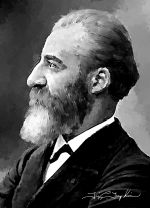
Henri Moissan Doctoral degree
The Nobel Peace Prize in Chemistry 1906
Chemist - inorganic. Isolated fluorine. Moissan's electric furnace. Blue perchromic acid formula, crystallized chromic acid. Uncovered silicon carbide, other carbides, borides, silicides. Theorized:
from molten iron crystallize carbon under pressure, obtain synthetic diamonds. Meticulous, patient. Articulate lecturer.
“Scientific research is search for truth. Only after discovery, applicability can be considered.â€
Quotations
“The search for an element is always captivating.â€
-- The Discovery of the Elements (p. 438), Journal of Chemical Education. 1956
“To tread a newly opened furrow, to feel complete freedom of action, and to see on all sides new vistas opening for research, brings with it a joy that only those who have had the raw pleasure of original research are fully in a position to grasp.â€
“The advancement of science is slow; it is effected only by virtue of hard work and perseverance. And when a result is attained, should we not in recognition connect it with the efforts of those who have preceded us, who have struggled and suffered in advance? Is it not truly a duty to recall the difficulties which they vanquished, the thoughts which guided them; and how men of different nations, ideas, positions, and characters, moved solely by the love of science, have bequeathed to us the unsolved problem? Should not the last comer recall the researches of his predecessors while adding in his turn his contribution of intelligence and of labor? Here is an intellectual collaboration consecrated entirely to the search for truth, and which continues from century to century.†- Proceedings of the Royal Institution (1897). In Annual Report of the Board of Regents of the Smithsonian Institution to July 1897 (1898), 262.
“Will fluorine ever have practical applications?
It is very difficult to answer this question. I may, however, say in all sincerity that I gave this subject little thought when I undertook my researches, and I believe that all the chemists whose attempts preceded mine gave it no more consideration.
A scientific research is a search after truth, and it is only after discovery that the question of applicability can be usefully considered.â€
— Proceedings of the Royal Institution (1897). In Annual Report of the Board of Regents of the Smithsonian Institution to July 1897 (1898), 261.
“Without preparing fluorine, without being able to separate it from the substances with which it is united, chemistry has been able to study and to analyze a great number of its compounds. The body was not isolated, and yet its place was marked in our classifications. This well demonstrates the usefulness of a scientific theory, a theory which is regarded as true during a certain time, which correlates facts and leads the mind to new hypotheses, the first causes of experimentation; which, little by little, destroy the theory itself, in order to replace it by another more in harmony with the progress of science.†- 'Fluorine', lecture at the Royal Institution (28 May 1897), translated from the French, in Proceedings of the Royal Institution (1897). In Annual Report of the Board of Regents of the Smithsonian Institution to July 1897 (1898), 262.
Discover Your Abilities and Aspirations!
 $10 $25 $50 $100 Other
$10 $25 $50 $100 Other
Tax Exempt 501(c)3 Non-Profit Organization
Any Currency
“…the peace that is found in libraries and laboratories…” - Louis Pasteur
Copyright © 2023 Ganga Library Inc. All Rights reserved.;

Photo Wiki. PD Painting Tim Tompkins PaintHistory.com
Name: Henri Moissan
Birth: 28 September, 1952, Paris, France
Death: 20 February, 1907, Paris, France
Affiliation: Sorbonne University, Paris, France
Prize Motivation: "in recognition of the great services rendered by him in his investigation and isolation of the element fluorine, and for the adoption in the service of science of the electric furnace called after him."
Education: College de Meaux. Musee d’Histoire Naturelle - Edmond Fremy’s lab. Doctoral
degree Agronomic Institute 1880; thesis: cyanogen series.
Biography
Eponyms
Books
Publications
Quotations
Images














